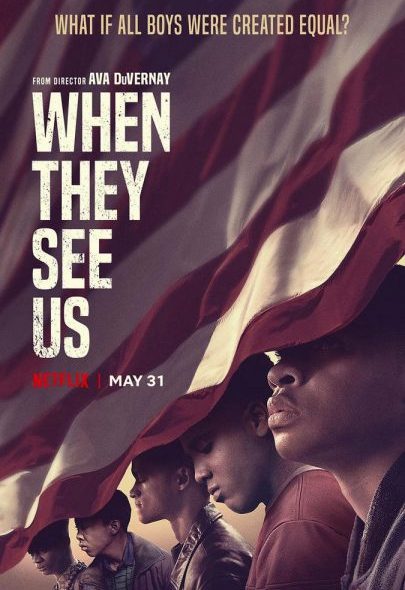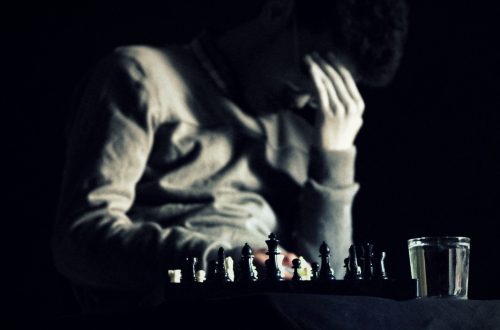“When They See Us,” Ava DuVernay’s Netflix limited series about the wrongly-accused Central Park Five is a horror show, not because the graphic depiction of violence five Black and Latino boys — Antron McCray, Kevin Richardson, Yusef Salaam, Raymond Santana, and Korey Wise — suffer at the hands of the New York district attorneys and the NYPD, or because these then boys were robbed of their youth and innocence by a broken and corrupt criminal (in)justice system, or because of the anguish five families endured due to no reason of their own. No. The horror of “When They See Us” is that the very acts of abject racism perpetrated against McCray, Richardson, Salaam, Santana, and Wise in DuVernay’s masterpiece continue to occur with impunity in these United States some thirty years later.
This true story, written and directed by DuVernay, is broken into four parts. Part 1 covers the boys’ arrest and coerced confessions to the brutal attack and rape of a female Central Park jogger. Part 2 deals with the hardships the boys, their families, and their lawyers face during the trial. In Part 3, DuVernay takes us behind bars with four of the boys and their subsequent and difficult return to life in the outside world. And Part 4 focuses on Korey Wise’s brutal experiences in prison, the eventual exoneration of the men, and updates viewers as to the current activities of the five today.
DuVernay is the griot of our culture and time, and instead of relying solely on an oral recounting, she incorporates all forms of art available in telling the stories of our collective past and present via film and television. In her brilliance, she does not sugar coat this story. Hers is neither a trite retelling, a gratuitous hot take, nor is it a sanitized made-for-tv pop opera with well-worn tropes. She gives viewers an unflinching and intimate look at the human toll wrought by corruption and racism. The thing that enrages me the most is that the system that perpetrated these heinous crimes against innocent black and brown people still exists and lies in wait with maw agape. From sea to shining sea.
The performances in “When They See Us” — especially those of the actors portraying Five — were raw, nuanced, and compelling as the best I’ve ever seen. These teens and their adult counterparts delivered portrayals that attest to the brilliant careers they have ahead. As far as I’m concerned, the Television Academy can proceed with engraving and affixing the nameplate to Jharrel Jerome’s Emmy right now for his performance as Korey Wise. Simply amazing.
I don’t like to “should” on people, but I think it’s necessary here.
The gift in films like “When They See Us” is that they foster much-needed conversation about systemic racism this country has long overlooked or swept under the rug in the name of comfort. To those who about to blow on their pitch pipes and tune-up the choir for an empassioned chorus of “But, America’s post-racial” — just stop. Can you imagine anything like this remotely happening to five white boys?
[cue: crickets chirping]
Not one person in their right mind living in any of the fifty states or its territories can imagine such an occurrence. A white supremacist can shoot and kill nine people in Bible study, be apprehended by police without a scratch, and taken to Burger King after arrest and Black people are killed routinely during traffic stops.¹
But I digress . . .
As I was saying, films like “When They See Us” should be required viewing for everyone. For families of color as an adjunct to “the talk,” so that their teens are aware of the very real dangers in the world. It’s one thing to tell your kids about what can happen, it’s another thing for them to see it play out before them. And do not think for a minute, this movie is too much for children . . . not when their peers are being gunned down in school. Trust me, they can handle it.
“When They See Us” should be required viewing for all White people who would lay claim to a non-racist worldview; all White people who cannot fathom why People of Color are suspicious of law enforcement; and let’s not forget all White People who can proudly chime the name of their one Black or Latino “friend.” If your reason for not seeing this film is because you feel “it doesn’t concern you,” you are selfish and delusional, and should be streaming this movie ten minutes ago.
We as a nation must change and realize that we have so much more in common than divides us and stop the othering. Discussing these matters and finding common ground is not the end of a problem, it’s the beginning of working towards a solution. We cannot fix what we don’t acknowledge. This film breaks one of this country’s great travesties into its component parts and lays it bare in its horrific nakedness for all the world to see. To not see the inhumanity of what happened thirty years ago — and that continues today, means that you are not fit to live among humans.
But I will say this, to see the men Antron McCray, Kevin Richardson, Yusef Salaam, Raymond Santana, and Korey Wise are today reveals their character and inner strength. And that’s a debt society owes these giants among heroes we can never fully repay — but that doesn’t mean we shouldn’t try.
Love one another.



